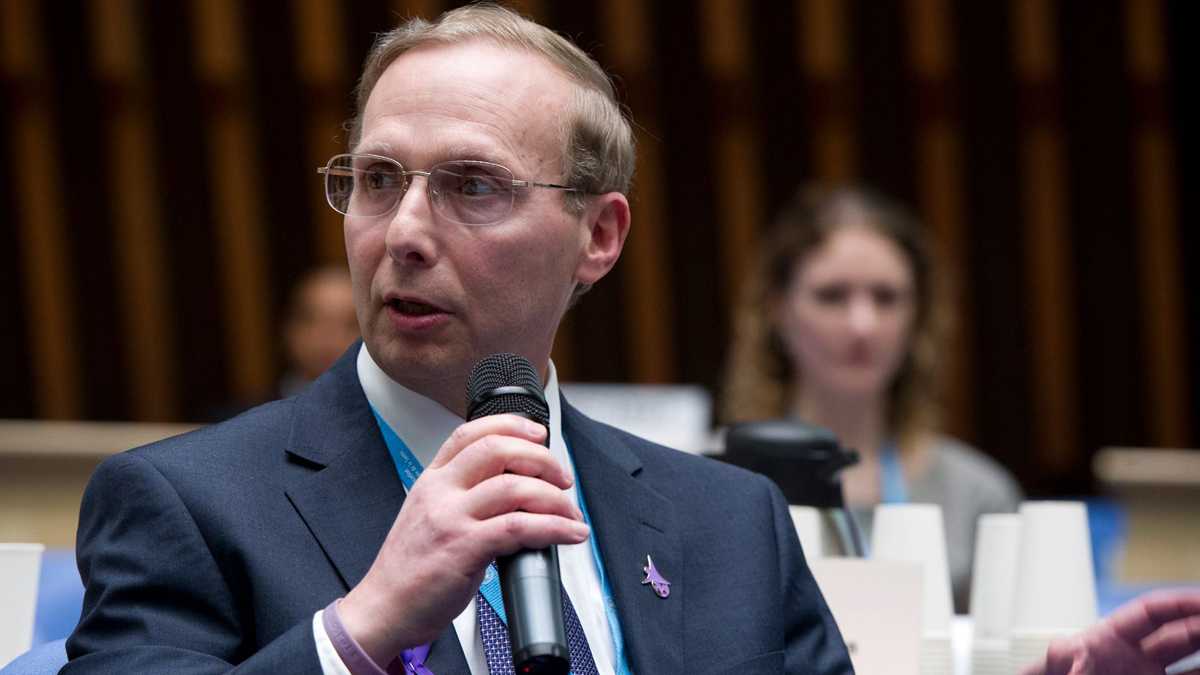Bucks County dementia advocate allowed to return to meetings
Listen
Michael Ellenbogen of Jamison, Pa. speaks during an Alzheimer's Association event. (Image via Facebook)
A local Alzheimer’s patient and activist who was banned from entering federal buildings after making a controversial statement is no longer viewed as a security threat.
After months of phone calls–and most recently, debate over the meaning of a letter from the federal Department of Health and Human Services–Michael Ellenbogen is declaring victory.
“The bottom line is, I’m happy,” he said.
The 57-year-old advocate from Bucks County is back on the National Alzheimer’s Project Act’s (NAPA) listserv and can attend meetings in governmental buildings following the standard security protocols.
HHS said its security position did not change, but confirmed that Ellenbogen would now be evaluated for risk just like any other meeting attendee.
“While we don’t know the exact nature of why HHS reversed its ban, we are thrilled with the results and happy that Michael can return to advocating for patient rights,” said Rahul Khara of Arnold & Porter, who represented Ellenbogen pro bono through USAgainstAlzheimer’s.
Ellenbogen’s trouble began back in January. Ironically, he had decided to skip attending a NAPA meeting in person because of the weather, and had his remarks read aloud.
In making a plea for more funding for Alzheimer’s research and for more awareness of the problem, he asked, “What do we need to do to get the attention of people like you? Will it take someone like me to have some sort of shootout like Columbine before someone will take notice?”
The rhetorical questions were followed by an assurance that he was not pondering violence: “I would not do that but I am trying to get your attention and I am failing and dying at the same time.”
Ellenbogen spoke in Geneva to the WHO about Alzheimer’s in March. But by late April the Health and Human Services department had barred him from participating in any sponsored meetings in person. He was told they viewed him as a security threat.
The Alzheimer’s Association also asked him to stay away, even from peer support groups.
“That was the biggest shocker to be honest with you,” said Ellenbogen. “Because, I mean, here’s an organization that’s supposedly supposed to support people with dementia, just threw me right under the bus!”
Kate Meyer, the director of public relations for the Association, said it had a responsibility to protect the safety of its members. The group allowed Ellenbogen to continue to use its online message boards and offered him access to staff members by phone, she said.
Following HHS’s lead, the Association has now reversed its position and welcomes Ellenbogen back to attend events in person.
While Ellenbogen is pleased with the final outcome, he said the actions reflect a huge failure of both organizations to understand the very nature of dementia.
“You can’t just shut somebody up with dementia because we say the wrong thing. The fact of life is we have lost our filters in many ways,” he said. “Society needs to learn how to deal with this a little bit better.”
He plans to continue his advocacy, and hopes to make it to the next NAPA meeting in D.C. in October.
WHYY is your source for fact-based, in-depth journalism and information. As a nonprofit organization, we rely on financial support from readers like you. Please give today.

